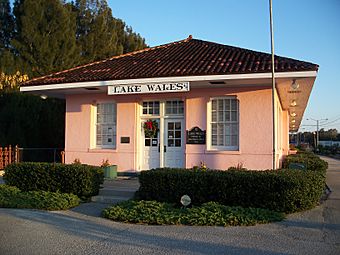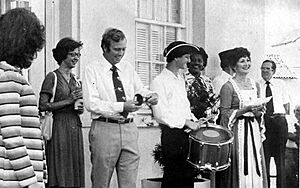Lake Wales station facts for kids
Quick facts for kids |
|
|
Atlantic Coast Line Railroad Depot
|
|
 |
|
| Location | 325 South Scenic Highway Lake Wales, Florida |
|---|---|
| Built | 1928 |
| Architect | R.W. Burrows Construction Company |
| Architectural style | Mediterranean Revival |
| MPS | Lake Wales MPS |
| NRHP reference No. | 90001277 |
| Added to NRHP | August 31, 1990 |
The Atlantic Coast Line Railroad Station was once a busy train stop in Lake Wales, Florida. It was a place where people boarded trains and goods were loaded. On August 31, 1990, this special building was added to the U.S. National Register of Historic Places. This means it is an important historical site that should be protected. Today, the building is home to the Lake Wales History Museum.
Contents
The Station's Early Days
This train station was built in 1928 by the Atlantic Coast Line Railroad and the R.W. Burrows Construction Company. It cost about $51,000 to build, which was a lot of money back then! The new station was built to replace an older one. Its location helped reduce traffic in the busy downtown area of Lake Wales. In 1938, a special room for freight (goods carried by train) and a loading platform were added.
Trains Stop Running
For many years, people traveled by train from this station. However, passenger train service to Lake Wales ended in 1954. After that, the station mostly handled freight. It was a key spot for moving goods by train since the 1930s. But in 1974, freight service moved to a different station in West Lake Wales. From that point on, trains no longer stopped at this historic depot.
From Station to Museum
After the trains left, the building sat empty for a while. In 1974, people in Lake Wales started working to give the old station a new purpose. They wanted to turn it into a museum and a place for local art and culture.
In 1976, the Atlantic Coast Line Railroad Station officially opened as the Lake Wales Depot Museum. Today, it is known as the Lake Wales History Museum. The museum is run by a group called Lake Wales History Museum, Inc., with help from the City of Lake Wales. Inside, you can see many interesting exhibits, including a cool model railroad layout!
Building Style and Features
The station is a one-story building made of strong materials. It shows off the Mediterranean Revival Style, which was popular in Florida in the 1920s. The outside walls are covered with smooth stucco, and the roof has a special barrel tile surface. A brick chimney sticks up from the middle of the roof.
Inside the Old Station
The outside of the building still looks much like it did when it was first built. The only major change was the addition of the freight room in 1938. When the station became a museum in the 1970s, some changes were made inside. However, you can still see the original ticket window in the waiting room. The freight room at the back of the building has changed very little. It still has its original support columns, exposed ceiling beams, and wooden plank floor.
 | May Edward Chinn |
 | Rebecca Cole |
 | Alexa Canady |
 | Dorothy Lavinia Brown |




